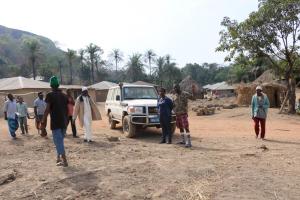Measles outbreak confirmed in northern Sierra Leone
Health sector response mounted, including preparations for targeted vaccine campaign
FREETOWN, June 14 2018 - The Ministry of Health and Sanitation today declared a measles outbreak in Falaba district in the northern part of Sierra Leone. There have been a total of 19 confirmed cases this week in the Chiefdoms of Sulima (14 cases) and Mongo (5 cases), close to the border with Guinea.
A measles outbreak is defined as three or more laboratory confirmed cases in a community or district in one month.
“We are doing everything in our power to bring this outbreak under control, with teams already on the ground leading the response,” said Dr. Brima Kargbo, Chief Medical Officer at the Ministry of Health and Sanitation. “Given the location of the affected communities, we are working with our counterparts in Guinea to ensure continued collaboration on measles vaccination efforts, community engagement and surveillance.”
Measles is a serious but vaccine-preventable disease that is caused by a virus. When children are unvaccinated, the virus can spread quickly and cause severe illness, disability and deaths. A safe, free and effective vaccine is available to protect children against measles virus, with two doses given as part of the routine vaccination schedule in Sierra Leone (the first dose at 9 months and the second at 15 months).
“While we are planning an emergency vaccination campaign within the affected areas, we want to encourage all caregivers everywhere in the country to ensure children aged under 2 years have received their two doses of the measles marklate, which provides lasting protection against the disease,” said Dr. Kargbo. “Vaccination is the only reliable way to ensure your child is protected against this life-threatening illness, which can be devastating in its effects.”
With support from WHO, MSF, UNICEF, UK Aid and other partners, the response to the recent cases will include a targeted vaccination campaign for children in affected and most at-risk areas, cross-border collaboration and community engagement, contact-tracing and enhanced surveillance for suspected measles cases. Parents and caregivers are also being reminded to ensure their children’s routine vaccines are up to date.
“Across the country, vaccination uptake has recovered following the Ebola outbreak,” said Dr. Kargbo. “However there are still areas where vaccination coverage is sub-optimal, especially in communities that are very remote and where populations are mobile and travelling across borders. This will require concerted efforts not only from our health workers but also caregivers, communities, local authorities and health partners to ensure that every child, everywhere is reached with their necessary vaccines.”
The vaccine campaign in Koinadugu and Fabala districts is expected to start within the next two weeks.
Contacts
At MoHS
Harold Thomas: haroldthomas2007 [at] yahoo.com (haroldthomas2007[at]yahoo[dot]com), +232 76 602 460
Kadri Koroma: kadriekoroma [at] yahoo.com (kadriekoroma[at]yahoo[dot]com), +232 76 762 962
At WHO
Laura Keenan: keenanl [at] who.int (keenanl[at]who[dot]int), +232 786 33952
Editor's note: The 19 confirmed cases to date are within the newly defined district boundaries of Falaba district, with additional cases being investigated in neighbouring areas in Koinadugu. The response is currently being administered by the Koinadugu District Health Management Team.



